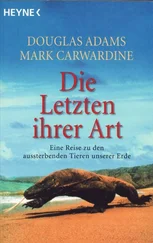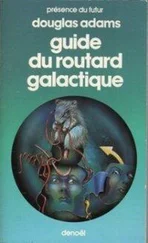Douglas Adams - Last chance to see
Здесь есть возможность читать онлайн «Douglas Adams - Last chance to see» весь текст электронной книги совершенно бесплатно (целиком полную версию без сокращений). В некоторых случаях можно слушать аудио, скачать через торрент в формате fb2 и присутствует краткое содержание. Жанр: Фантастика и фэнтези, на английском языке. Описание произведения, (предисловие) а так же отзывы посетителей доступны на портале библиотеки ЛибКат.
- Название:Last chance to see
- Автор:
- Жанр:
- Год:неизвестен
- ISBN:нет данных
- Рейтинг книги:5 / 5. Голосов: 1
-
Избранное:Добавить в избранное
- Отзывы:
-
Ваша оценка:
- 100
- 1
- 2
- 3
- 4
- 5
Last chance to see: краткое содержание, описание и аннотация
Предлагаем к чтению аннотацию, описание, краткое содержание или предисловие (зависит от того, что написал сам автор книги «Last chance to see»). Если вы не нашли необходимую информацию о книге — напишите в комментариях, мы постараемся отыскать её.
Last chance to see — читать онлайн бесплатно полную книгу (весь текст) целиком
Ниже представлен текст книги, разбитый по страницам. Система сохранения места последней прочитанной страницы, позволяет с удобством читать онлайн бесплатно книгу «Last chance to see», без необходимости каждый раз заново искать на чём Вы остановились. Поставьте закладку, и сможете в любой момент перейти на страницу, на которой закончили чтение.
Интервал:
Закладка:
`Yes,' we agreed. `Ficky ficky.'
Pleased that all was clear now, he wandered off and left us to it as, each in turn, we listened to the tape over headphones.
The sound we heard wasn't exactly what I had expected. Water is a very good medium for the propagation of sound and I had expected to hear clearly the heavy, pounding reverberations of each of the boats that had gone thundering by us as we stood on the deck. But water transmits sound even better than that, and what we were hearing was everything that was happening in the Yangtze for many, many miles around, jumbled cacophonously together.
Instead of hearing the roar of each individual ship's propeller, what we heard was a sustained shrieking blast of pure white noise, in which nothing could be distinguished at all.
Happily, Professor Zhou did exist. Not only did he exist, but when Mark went to look for him at Nanjing University (I was ill that day), he was actually in and agreed to come and have dinner with us at the Jing Ling Hotel (by which time I was better because it was quite a good restaurant).
He was a polite, kindly man of about sixty. He guided us graciously through the unfamiliar menu and introduced us to the local delicacy, namely Nanjing Duck. This turned out to be very similar to Peking Duck (or Beijing Duck as we now know it - or, to be strictly accurate, Szechwan Duck, which is what we have been eating for years under the name Peking Duck. We had some wonderful Szechwan Duck in Beijing, because that's what they eat there. Beijing Duck is something different and comes in two courses, the second of which is usually not worth bothering with). To conclude: Nanjing Duck turned out to be very similar to Szechwan Duck except that they spoil the thing by coating it with a solid half-inch layer of salt. Professor Zhou agreed that it didn't taste nearly as pleasant that way, but that was how they did it in Nanjing.
Professor Zhou welcomed us to China, was surprised and delighted that we had come all this way to see the dolphins, said that he would do everything he possibly could to help us, but didn't think it would do us any good. Things are difficult in China, he confided. He promised to try and phone the people at the dolphin conservation project in Tongling to warn them that we were coming, but didn't hold out much hope because he'd been trying to get through to them on his own account for weeks.
He said that, yes, we were right. The noise in the Yangtze was a major problem for the dolphins, and severely interfered with their echolocation. The dolphins' habit had always been, when they heard a boat, to make a long dive, change direction underwater, swim under the boat and surface behind it. Now, when they are under the boat, they get confused and surface too soon, right under the propellers.
These things had all happened very suddenly, he said. The Yangtze had remained unspoilt for millions of years, but over the last few years had changed very dramatically, and the dolphin had no habit of adaptation.
The very existence of the dolphin had not been known of until relatively recently. Fishermen had always known of them, but fishermen did not often talk to zoologists, and there had been a recent painful period in China's history, of course, when nobody talked to scientists of any kind, merely denounced them to the Party for wearing glasses.
The dolphin was first discovered, in Dong Ting Lake, not in the Yangtze, in 1914 when a visiting American killed one and took it back to the Smithsonian. It was obviously a new species and genus of river dolphin, but little further interest was taken in it.
Then, in the late fifties, Professor Zhou returned from a field trip studying birds, to find an unlabelled skeleton waiting for him. It was the same species of dolphin, but this had been discovered, not in Dong Ting Lake, where they no longer existed, but in the river near Nanjing.
He interviewed some local fishermen who said they did see them from time to time. Any that were accidentally caught were sold for food. The ones that got caught in the fishing lines had a bad time of it, because the lines the fishermen traditionally use along the banks of the Yangtze are baited with hundreds of large, bare hooks.
Some studies were carried out around Nanjing, but for a while the Cultural Revolution put a stop to all that. Research picked up again in the seventies, but the difficulties of communication within China were such that research was only local, and no one really had a feel for exactly how rare the animal was, or what kind of predicament it was in.
That all changed in 1984.
Some peasants found a baiji stranded in the shallows near Tongling, further upriver. They reported it to the Agricultural Commission of the Tongling Municipal Government, who took an interest and sent someone along to take a look at it.
This immediately began to flush out a whole lot of stuff.
All sorts of. people were suddenly popping up and saying that they had also seen a dolphin hit by a boat or caught in a net or washed up in a bloody mess somewhere.
The picture that emerged from putting all these hitherto isolated incidents together was an alarming one. It was suddenly horribly apparent that this dolphin was not merely rare, it was in mortal danger.
Professor Zhou was brought along from Nanjing to assess what should be done. Here the story took an unusual and dramatic turn, because once he had assessed what should be done... the people of Tongling did it.
Within months a huge project was set up. to build a dolphin protection reserve within the Yangtze itself, and now, five years later, it is almost complete.
`You should go to see it,' said Professor Zhou. `It is very good. I will try my best to phone them to prepare for your arrival, so you may rest... what is the word?
I said that rest sounded fine to me. I was all for some rest.
`Easily? Surely? Ah... assured. You may rest assured that they will not be expecting you. So I will give you a letter also.'
For various reasons which had to do with making a diversion to see an alligator farm from which we then got chased by police on the grounds that we did not have the appropriate alligator permits, we ended up taking a taxi to Tongling, a mere one hundred and twenty miles. We got a special deal on the taxi. Part of the special deal was that we didn't have a very good taxi driver, or indeed a very good taxi, and we arrived in Tongling in a state of some nervous tension.
Foreigners are not allowed to drive in China, and you can see why. The Chinese drive, or cycle, according to laws that are simply not apparent to an uninitiated observer, and I'm thinking not merely of the laws of the Highway Code, I'm thinking of the laws of physics. By the end of our stay in China I had learnt to accept that if you are driving along a two lane road behind another car or truck, and there are two vehicles speeding towards you, one of which is overtaking the other, the immediate response of your driver will be to also pull out and overtake. Somehow, magically, it all works out in the end.
What I could never get used to, however, was this situation: the vehicle in front of you is overtaking the vehicle in front of him, and your driver pulls out and overtakes the overtaking vehicle, just as three other vehicles are coming towards you performing exactly the same manoeuvre. Presumably Sir Isaac Newton has long ago been discredited as a bourgeois capitalist running dog lackey.
Tongling, in turn, made us long wistfully for the cheerful, familiar hominess of Nanjing.
To quote the welcoming brochure for tourists that I found in my bleak hotel bedroom: 'As a new rising industrial mining city, Tongling has already founded a rather scale of non-ferrous metallurgical, chemical, textile, building material, electronics, machinery, iron and steel and coal industries; especially the non-ferrous metallurgical building material and chemical industries, which, with a broad prospect of development, have already made or been on the way of making Tongling the major production centre.'
Читать дальшеИнтервал:
Закладка:
Похожие книги на «Last chance to see»
Представляем Вашему вниманию похожие книги на «Last chance to see» списком для выбора. Мы отобрали схожую по названию и смыслу литературу в надежде предоставить читателям больше вариантов отыскать новые, интересные, ещё непрочитанные произведения.
Обсуждение, отзывы о книге «Last chance to see» и просто собственные мнения читателей. Оставьте ваши комментарии, напишите, что Вы думаете о произведении, его смысле или главных героях. Укажите что конкретно понравилось, а что нет, и почему Вы так считаете.







